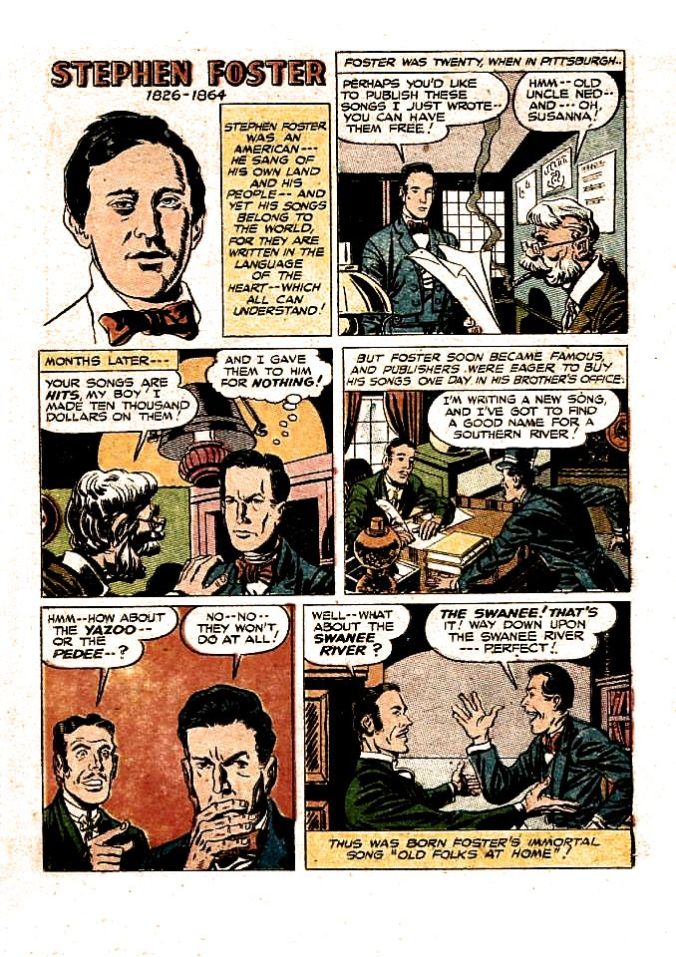
Now that I’m retired, I begin each morning with a leisurely stroll through the pages of “The South’s Oldest Newspaper,” the Post and Courier. One of my favorite features is “Today in History,” which chronologically recaps the high-and-lowlights that occurred on the day the edition appears. For example, today, the 13th of January, we have in 1941 Puerto Ricans gaining birthright citizenship and James Joyce succumbing to an ulcer less than a month before his 59th birthday.
The aged sisters draw us into life: we wail, batten, sport, clip, clasp, sunder, dwindle, die; over us dead they bend. Joyce, from Ulysses
The 13th of January was an unlucky day for several other notables as well. In 1962 Comedian Ernie Kovacs perished in an auto crash, and 16 years later, former Vice President Hubert H Humphrey died in Waverly, Minnesota at the age of 66.
The saddest death recorded that day, however, belongs to Stephen Foster, America’s first great songwriter, who, estranged from his wife, drunkenly slipped on a piece of glass while shaving in a flophouse in the Bowery. In the fall, he accidentally cut his neck, was found on the floor in a pool of blood, and died at Bellevue Hospital 3 days later. On the day of his death, his worldly possessions consisted of that razor, a comb, a few items of clothing, and a leather wallet. The wallet contained 38 cents in Civil War scrip, 3 pennies, and a scrap of paper with the words “Dear Hearts and Gentle People” scrawled on it.
 I first heard of Stephen Foster’s music orally when my father would rock and sing me to sleep and from my Grandfather Kiki who sang “Campton Ladies” while playing his ukulele.
I first heard of Stephen Foster’s music orally when my father would rock and sing me to sleep and from my Grandfather Kiki who sang “Campton Ladies” while playing his ukulele.
‘Doo-dah, doo-dah.”
My father, a sentimentalist, told me about Foster’s sad life, often the fate of geniuses, he intimated. Although Foster did write comic songs, the majority of them pulled on the proverbial heartstrings.
We have roamed and loved mid the bowers
When thy downy cheeks were in their bloom
Now I stand alone mid the flowers
While they mingle their perfumes o’er thy tomb.
Because he wrote for the Christy Minstrels, a Northern blackface minstrel troupe, and sentimentalized the plight of slaves, Foster is now a controversial figure. Defenders claim that Foster’s attitude was sympathetic and that he admired African American slaves.
Others, not surprisingly, disagree. In 2010 members of the Yale Glee Club refused to sing “My Old Kentucky Home” at a concert and later burned a copy of the song, according to Ken Emerson, Foster’s biographer, “[My Old Kentucky Home], he writes, “was actually inspired by “Uncle Tom’s Cabin,” a deeply abolitionist novel. And the sense of loss here, and the sense is because Uncle Tom is being sold down the river as he was in the famous novel.”
Ironically, Foster hailed from Pennsylvania and only travelled below the Mason-Dixon line once in his life on a honeymoon steamboat cruise to New Orleans.
Emerson, the biographer, goes on to say, “his politics were definitely not abolitionist, but his heart and his feelings were very strongly sympathetic with the African-American plight. This contradiction, I think, is – the conflict between sentimentality and self-interest is something that, I think, characterizes – has always characterized Americans.”
And the songs themselves reflect the ol’ melting pot metaphor, an amalgam of Irish, African American, Italian, German, and Czechoslovakian influences. For example, “Oh Susanna” is rendered in a polka beat.
Again, Emerson: “And I think he merged [the various musical influences] in way that appeals to the multicultural, mongrel experience of America in its history and culture.”
The bottom line is that Foster remains popular even today, a century-and-a-half after his death, a rarity for a pop artist. In fact, I own a 2004 tribute album that features such artists as Alvin Youngblood Heart, John Prine, Mavis Staples, Roger McQuinn, and Michelle Shocked.
The combination of those beautiful melodies he created and pathos he conjured can still mesmerize.
Very sad story and so important to know about. Thanks for the history lesson. Love knowing more about this beautiful man. â¤ï¸
Sent from my iPhone
>
Thanks, Dana!
Enjoyed this article! I peruse “This Day In History” as well. Oh but I long for the days of The Post and Courier, and it’s sister paper “The Charleston Evening Post”, both of which I delivered in my small hometown of Bonneau, SC. As a boy. Thank you for your great efforts to keep us aware of our past!
Thanks for reading and commenting, James. Glad to hear you still read Post and Courier. Cheers!